
All caught up with our top 50 films of 2014? It’s now time to look to the new year and ahead of our 100 most-anticipated films, we’re highlighting 40 films we’ve enjoyed on the festival circuit the last year (and as far back as 2009) that will likely see a release this year. While the first batch have confirmed dates all the way through the summer, we’ve also included a handful that we’re hopeful will get a release by year’s end (distributors, take note!).
It should also be mentioned, while we’ve included our 40 favorites below, we’ve reviewed a host of other forthcoming releases, including Mommy, Manglehorn, Lost River, Saint Laurent, Good Kill, The Cobbler, The Search, Grace of Monaco, From What Is Before, The Riot Club, Adult Beginners, The New Girlfriend, Magical Girl, Kill Me Three Times, Gemma Bovery, Coming Home, Welcome to Me, Cub, Felt, Alex of Venice, 5 to 7, 1971, Every Secret Thing, Boulevard, The Cut, Anarchy, Kumiko, the Treasure Hunter, La Sapienza, Alleluia, Tu dors Nicole, Over Your Dead Body, Wild Canaries, A Little Chaos, Everly, Electric Boogaloo: The Wild, Untold Story of Cannon Films, and more. So, ahead of a feature on the anticipated films we haven’t seen yet, check out some verified quality films below, with links to our reviews.
Duke of Burgundy (Peter Strickland; Jan. 23rd)
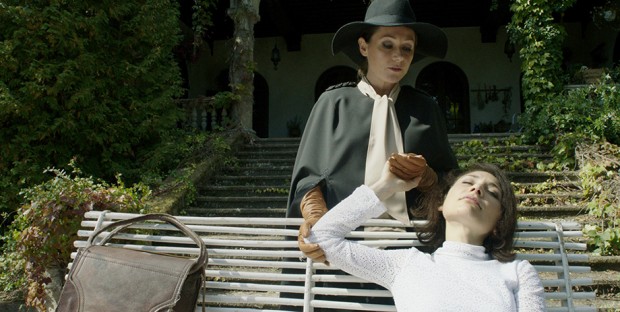
Sometimes one just needs to cleanse their palette or expand their mind by checking out a film even the director says is all about the experience. So when Peter Strickland explains how he tried hard not to make us want to find metaphor or meaning beyond what’s onscreen, I’m going to take him at his word. He also admitted the title The Duke of Burgundy was a joke–which “ended too late to change it”–that was intentionally misleading considering a staunch period piece this most certainly is not. No, this depraved sex dream showcasing two female lovers who push each other to the brink of sanity is more of the cricket and butterfly persuasion, or at least it has crickets and butterflies. And mannequins. – Jared M. (full review)
Timbuktu (Abderrahmane Sissako; Jan. 28th)

Abderrahmane Sissako can no longer be called one of the greatest African directors of our time; he has become, simply, one of the greatest directors of our time. With his fifth feature, Timbuktu, Sissako fuses the poetic visual language of Waiting for Happiness with the political urgency of Bamako to bring about a revelatory work, something along the lines of a Howard Hawks jihadi-hangout movie. I mean that as a very good thing. – Peter L. (full review)
Hard to Be a God (Aleksei German; Jan. 30th)
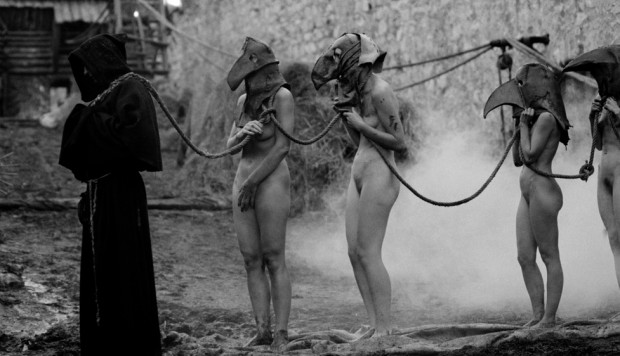
It is, without a doubt, a stunningly radical work: a three-hour journey into the heart of darkness that doesn’t just grab you, but envelops, haunted by a moral bleakness that leaves nothing beyond the images of terror it creates. While German remains simply a curiosity in the United States (he is as beloved as Tarkovsky in Russia), Hard to Be a God is the perfection of the director’s long-take approach, likely to remain unmatched for years to come. – Peter L. (full review)
Ballet 422 (Jody Lee Lipes; Feb. 6th)
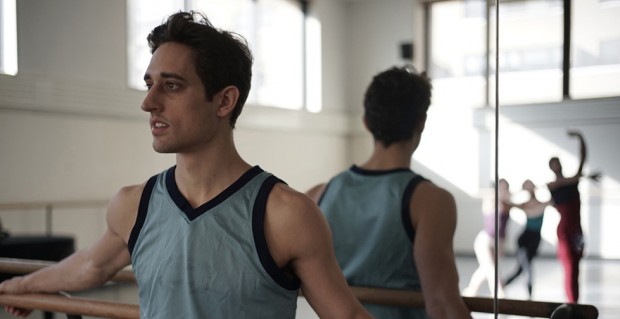
The inception and design that goes into creating any artistic work is a marvel to witness. It is this purity of concept that propels director and cinematographer Jody Lee Lipess’ captivating documentary about a young prodigy ballet dancer, Justin Peck. The film is as much about documenting the creative process as documenting the intricacies of ballet. With its brisk pace and unique style, Ballet 422 is a cinematic delight that encapsulates the passion of two inspired artists: the one in front of the camera and the one behind it. – Raffi A. (full review)
The Voices (Marjane Satrapi; Feb. 6th)
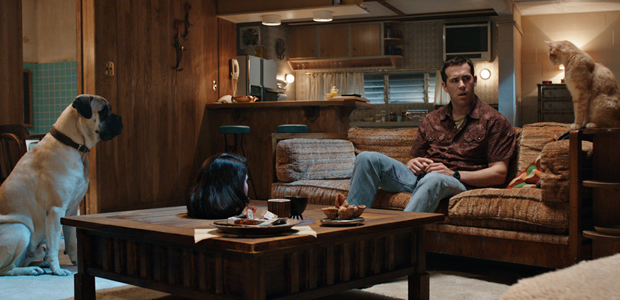
Struggling to find his place in Hollywood after a string of failures, Ryan Reynolds has turned to a handful of independent features in some attempt to regain footing — and first out of the gate brings his most impressive, substantial performance yet, in Marjane Satrapi‘s profoundly dark comedy The Voices. The initial set-up sounds like it could be the next wacky Disney feature, with Reynolds playing Jerry, a happy-go-lucky employee at a bathtub manufacturer who literally sees butterflies next to Fiona (Gemma Arterton), the co-worker he’s pining over. This heightened reality is taken to another level when he comes home: his dog, Bosco, and his cat, Mr. Whiskers, talk to him, acting as a kind of shoulder angel and devil, respectively. – Jordan R. (full review)
Da Sweet Blood of Jesus (Spike Lee; Feb. 13th)
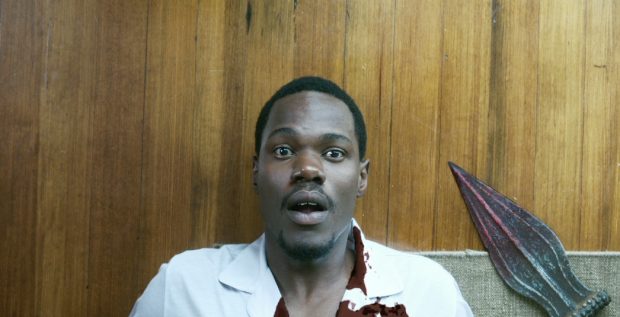
One cannot take lightly the implications of a candid filmmaker opening his latest picture with the words “An Official Spike Lee Joint.” Before we can even imagine what’s to come, his third endeavor in as many years — yet only the second of two joints and, indeed, successor to “A Spike Lee Film” that was publicly encapsulated by its credited maker with the words “tough business” — thus immediately establishes itself as a push against any and all who’d care to silence his voice. A quick introductory scene practically elides over the last title’s existence wholesale, bringing us back to the church of Red Hook Summer’s since-deceased Bishop Enoch — less for the sake of delineating proper continuity between works and more, it seems, for the sake of situating and making comfortable those who are about to be offset and discomfited. As, over mere minutes, the scope rapidly expands and the voice in command only grows louder, soon made into the equivalent of a madhouse blare, his push is now in defiance of many a crucial thing: total coherence, absolute logic, formal consistency, moral decency, and good taste. – Nick N. (full review)
Wild Tales (Damián Szifrón; Feb. 20th)

Zipping through its six unconnected stories, Wild Tales is a mix of Buñuel-ian absurdism and violent black comedy, subtly raising issues of sexual and national politics, bureaucracy and class while never losing focus of the surface-level entertainment that you’re there to see. Each story builds from a simple everyday event — a man helping a woman stow a suitcase on a plane, for example, or a man’s car being towed — to an unexpected and shocking ending. It’s worth avoiding plot information or trailers to keep retain surprise from first step to last, even though not knowing about these moments will make for a hard sell. – Martin J. (full review)
Maps to the Stars (David Cronenberg; Feb. 27th)
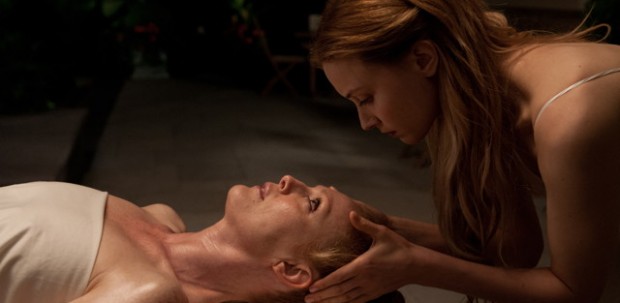
After making one of the most authentically emotional films of his career with A Dangerous Method, David Cronenberg has begun exploring the world of artificiality. Cosmopolis, which may end up standing as the director’s best film, explored the idea of capitalism in the digital age by creating a language, a series of green screen windows, and, essentially, a society in which numbers and data trumped any factors that might be described as physical. The same could be said for Maps to the Stars, except the target here is the artifice of Hollywood. – Peter L. (full review)
‘71 (Yann Demange; Feb. 27th)
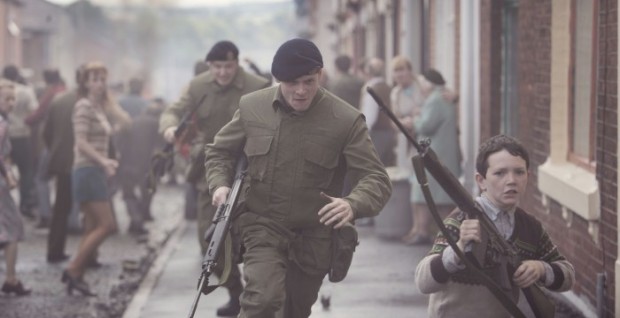
In an AFI Fest post-screening discussion of his new film ’71, director Yann Demange expressed the legitimate concern that certain audiences, specifically those of an American stripe, may not know enough about “The Troubles” to appreciate the film’s historical accuracy. While a good number of Americans can likely draw on enough existing knowledge about their national conflicts (e.g. WWII or Vietnam) to grasp the significance of films depicting such events, comprehension of the Northern Ireland conflict is seemingly surface-deep. Demange was adamant that the political elements on display in ’71 are, in fact, historically accurate. – Brian P. (full review)
My Life Directed by Nicolas Winding Refn (Liv Corfen; Feb. 27th)

Honesty is hard to come by in the movie industry. With millions of dollars at stake, safe repetition is often the easiest, well-treaded path. My Life Directed By Nicolas Winding Refn, a 58-minute documentary about the making of Only God Forgives, challenges the norm and reveals a working director’s latest film and his struggle to figure out how to bring it to life. The film was shot by director Nicolas Winding Refn’s wife, Liv Corfixen, and it gives us intimate, day-by-day access to their life together during the six-month trip to Thailand with their two children and the way Refn tries to blend being an artist and having a family. Challenging and engaging, it’s a documentary that is perhaps more interesting and deep than the film it is about. – Bill G. (full review)
Faults (Riley Stearns; March 6th)
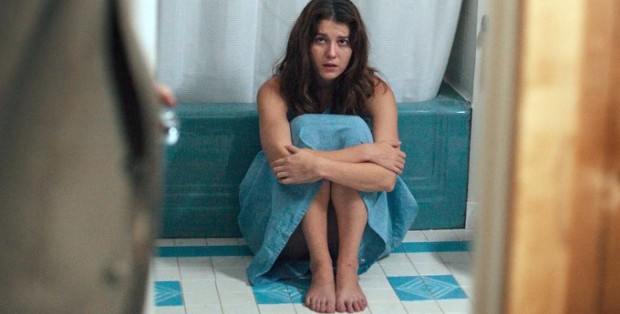
With Sound of My Voice, Martha Marcy May Marlene, The Master, and more, filmmakers’ fascination with cults seems to have hit a surge as of late, particularly exploring what it does to people’s psyche and the way that it, in turn, affects the people around them. Not everyone who joins a cult is without family or friends, so what happens when the family you willingly left behind drags you back into their lives? Written and directed by Riley Stearns (who is making his feature film debut at SXSW), Faults follows Ansel (Leland Orser), a cult deprogrammer who is down on his luck. – Bill G. (full review)
Buzzard (Joel Potrykus; March 6th)

In an episode of my podcast, The Cinephiliacs, colleague Vadim Rizov noted a humorous but mostly essential statement when describing his disappointment with the movement of the Duplass Brothers into more mainstream territory: “Bros need independent movies, too.” Most depictions of “bro culture” have depended on some of the loudest names in Hollywood — Judd Apatow, Adam McKay, and Seth Rogen among others. The problem is that these bro movies often seem to focus on the pleasures and perils of being a bro — a subject only worthy of intermittent screen depiction — and few of them use that milieu to explore other factors. That’s what makes Buzzard, Joel Potrykus’s second feature, one of the most exciting pictures in contemporary American cinema. – Peter L. (full review)
Merchants of Doubt (Robert Kenner; March 6th)
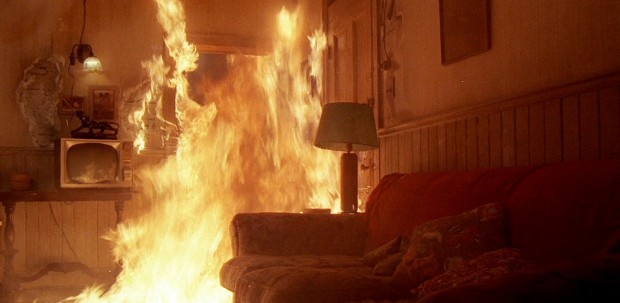
Climate change deniers say a lot of ridiculous things, but there’s one specific straw man argument they frequently fall back on that is so insulting in its ridiculousness, it’s unfathomable that anyone could buy into it. Even more upsetting than the crowds of people who burst into applause at the utterance of such statements is the confidence with which politicians and pundits relay such nonsense. The argument goes something like this: “It’s cold where I am, at this moment, so how can the temperature be rising?” Averages, apparently, are a mathematical fabrication. While most are well aware that this is simply another tactical attempt to further sway masses already inclined to buy into an anti-environmentalist stance, statements like the above exemplify what Merchants of Doubt is actually concerned with. – Brian P. (full review)
Seymour: An Introduction (Ethan Hawke; March 13th)

For many of us, Ethan Hawke is the playful, charismatic actor who’s had a solid career, with highlights often coming in the form of a Richard Linklater film. His work in the director’s Before trilogy and, most recently, Boyhood have made him recognizable as a likable guy struggling with questions of fulfillment and aging. It is perhaps unsurprising, then, to see him occasionally peek from behind the camera in Seymour: An Introduction, his first documentary, to tell stories and ask questions that reveal a persona not at all unlike his star image. – Forrest C. (full review)
Amour Fou (Jessica Hausner; March 18th)
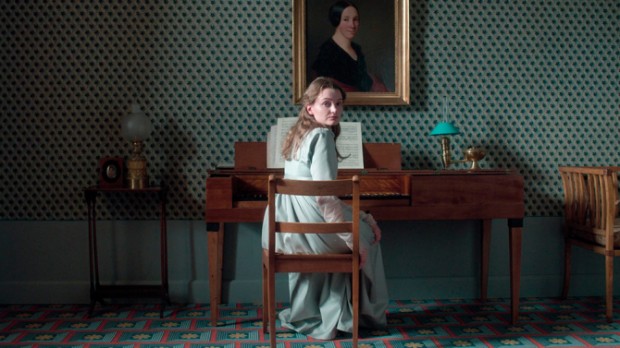
What will likely be the highlight of the Cannes Film Festival: Jessica Hausner‘s Amour Fou. The Austrian director’s sixth film is ecstatically original: a work of film-history-philosophy with a digital-cinema palette of acutely crafted compositions. Amour Fou seamlessly blends together the paintings of Vermeer, the acting of Bresson, and the psychological undercurrents of a Dostoevsky novel. It is an intensely thrilling work that manages to combine a passionately dispassionate love story of the highest order with a larger socio-historical examination of a new era of freedom, and the tragedy beset by those trapped in its enclosed world. – Peter L. (full review)
Jauja (Lisandro Alonso; March 20th)
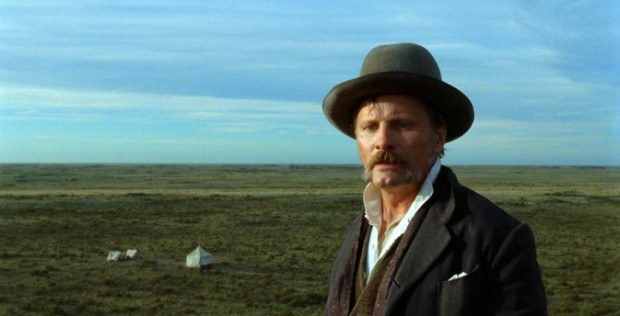
Jauja, the strange, beguiling, and excitedly didactic new film that premiered in the Un Certain Regard section of the Cannes Film Festival, is pure Alonso, even as it shows him transforming into something else. While Alonso has certainly embraced “narrative” (oh, that dirty word!), it would be laughable to call this anything resembling conventional, reinforcing the director as one of the most exciting slow-cinema filmmakers in the contemporary landscape. A 19th-century period piece, Jauja might be described as a quasi-Herzogian experience into the rocky terrain of the Argentinean desert, but Alonso has made this journey of madness his own thing, a film so possibly deceitful with its ultimate meaning that it’s best to buckle your seatbelts and enjoy the ride. – Peter L. (full review)
It Follows (David Robert Mitchell; March 27th)
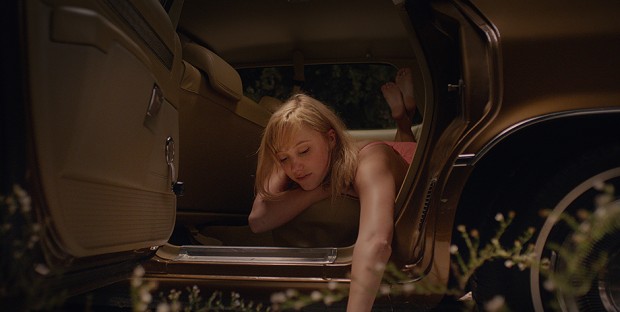
A teenage girl, captured through a static wide shot, runs through a quaint Detroit suburb, her body dwarfed by its trees and middle-class homes. The sense that something is not as it seems becomes realized quite quickly. This prologue, while one of the most formally well-executed sequences in the film, sets up a certain expectation, and luckily It Follows isn’t so much interested in that now-tired the-evil-that-lurks-under-the-surface-of-small-towns brand, but rather its invasion onto the iconography of it. – Ethan V. (full review)
While We’re Young (Noah Baumbach; March 27th)
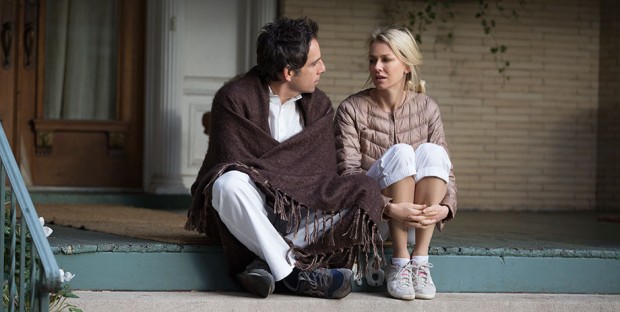
Noah Baumbach’s While We’re Young is wise, funny, fiercely intelligent and always involving. It’s not just the director’s most complete film — it’s also his best, an even stronger, more ambitious creation than his last Toronto International Film Festival entry, Frances Ha. Here, aided by his most impressive cast to date — Ben Stiller, Naomi Watts, Adam Driver, Amanda Seyfried, Charles Grodin, and Adam “Ad Rock” Horowitz (!) — Baumbach has pulled off something truly impressive. He has made a heartfelt comedy that is as humorous as it is emotionally relatable. – Chris S. (full review)
The Salt of the Earth (Wim Wenders and Juliano Ribeiro Salgado; March 27th)

At one point early in Wim Wenders‘ new documentary, The Salt of the Earth, the co-director details his deeply emotional connection to photographer Sebastiao Salgado. Years before the two ever met, Wenders happened across a couple of Salgado’s photographs in a Los Angeles art gallery that immediately enthralled him. One of these was a remarkable image of the Brazilian gold mines of Serra Pelada, the other a portrait-like image of a woman weathered by years of a life most will never know. – Brian P. (full review)
About Elly (Asghar Farhadi; April 8th)

A few years before A Separation left its considerable mark on the world-cinema landscape, Asghar Farhadi had another masterpiece under his belt. Why it’s been unavailable in the United States for some six years is a total mystery, but that (courtesy of Cinema Guild) has finally been taken care of — and now, at long last, here is About Elly. For fitting the mold of mystery, hangout movie, social critique, and gender-dynamics drama with equal aplomb, this film is the clearest example of Farhadi’s considerable powers. Its 2009 tag be damned, About Elly is likely to be one of the best “new” releases you’ll see this year. – Nick N.
Clouds of Sils Maria (Olivier Assayas; April 10th)

There are so many self-interpretations and meta moments in Clouds of Sils Maria, a puzzler that shows director Olivier Assayas evolving into a director of refinement, that it can seem exhausting. As actress Maria and personal assistant Val rehearse scenes from an upcoming play, it’s clear that the dialogue itself mimics their own relationship. Their sharing of interpretations bluntly address their own feelings, as if the text is almost falling over itself to tell you how to approach everything you need to know. It’s less a Rosetta Stone than reading an undergraduate thesis written about the film as it unfolds. – Peter L. (full review)
Iris (Albert Maysles; April 29th)

In 1970, David and Albert Maysles unleashed their seminal documentary Gimme Shelter. The brothers captured the violent events at the 1969 Altamont Speedway Festival with the Rolling Stones playing out an era of “peace and love.” Gimme Shelter is molded into a masterful set of images and moments that are explosive, dangerous, and alluring — much like the music of rock ‘n’ roll. Throughout their celebrated and prolific career, the Maysles siblings explored vast worlds, a portrait of American salesmen or the reclusive world of society’s elite in East Hampton making for some of their most iconic works. – Zade C. (full review)
Eden (Mia Hansen-Løve; May TBD)

It begins with a dark night in the woods and the occasional sight of a half-complete face or full-figure silhouette, such impressions stemming only from pale moonlight. These figures are followed over multiple shots, and what little can be discerned herein is quietly expanded upon with some illumination — soft, spotty, and artificial, but with an expressive quality that lets us know we’re outside all boundaries of normal civilization. After the first real exchange of dialogue comes the first true close-up: not of a face, but hands, this Bressonian gesture guiding the camera’s vision from a turntable to a stack of records to one record in particular, that special item an unidentifiable young man wishes to hear. The music starts, and, as if it is only through these sounds that the world can expand past this hermetic set, a cut proclaims “let there be light” — merely daylight to them, sure, yet the first thing through which “them” could be identified as more than just a shape. Without a spinning record, they are nothing. – Nick N. (full review)
The Princess of France (Matias Piñeiro; June 26th)

Although his films are rarely filled with the obvious cinematic references that color the works of Tarantino, Matias Piñeiro’s films are a different type of cinephile’s delight, engaging essential questions of how we watch and think about movies. His approach — relaxed, inconspicuous, playful, and, at times, perhaps mystical — makes their engagement of these issues feel revelatory. Then again, Hitchcock didn’t make Rear Window as a film directly about screen-based scopophilia, and Piñeiro’s films are up the same alley. His first four followed young lovers in and around Beunos Aires, shape-shifting their way through the texts of Shakespeare, their country’s own history, and, most importantly, their own romantic relationships. The Princess of France, his fifth endeavor, is decidedly his most complex, an investigation into the idea of the off-screen — though that’s only scratching the surface. – Peter L. (full review)
Release Dates to Be Announced
Horse Money (Pedro Costa; July TBD)
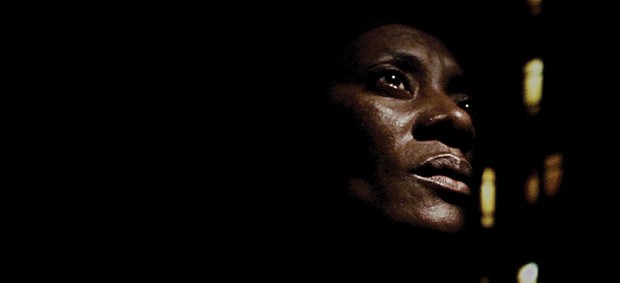
Often, when defining the auteur, one of the first things we go to is the consistency of location — that through a certain booming metropolis, quaint small town, or secluded countryside, we can surmise autobiographical details or even the utopian fantasies of the director at hand. All of this is easy in the case of Pedro Costa, coming off his Fontainhas trilogy, which depicted the struggles of the poor and drug-addicted denizens of Lisbon’s housing projects. – Ethan V. (full review)
The Look of Silence (Joshua Oppenheimer; Summer TBD)
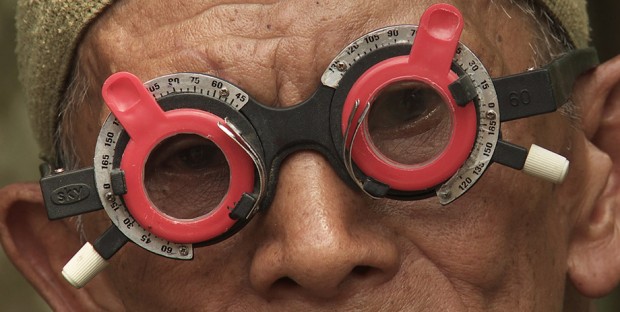
When sitting down to watch The Look of Silence – Joshua Oppenheimer‘s follow-up to 2012’s harrowing The Act of Killing – you’re struck by how quickly you can slip back into the particular brand of uncomfortable captured by its predecessor. The laughs, the jarringly playful recounting, the unblinking eye of the camera – it’s like a nightmare you find waiting for you when you go back to sleep, astonishingly unchanged. – Tommaso T. (full review)
99 Homes (Ramin Bahrani; TBD)
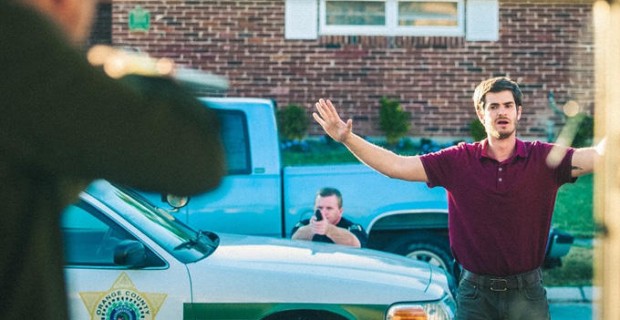
Ramin Bahrani made a name for himself with three independent films over the last decade, focusing on humanity’s daily struggles, reinvented foreign lives in America, and a fundamental sense of decency. With 2012’s At Any Price and this year’s 99 Homes, Bahrani has twice returned to the festival that launched his career, presenting the evolution of those themes. Not coincidentally, the worst years of the financial crisis stand between his acclaimed Goodbye, Solo and the tepidly received 2012 picture, and they must have had a profound effect on the direction of Bahrani’s filmography. With a broader canvas, flashier casts, and a more overt penchant for melodrama, At Any Price and 99 Homes single out agriculture and real estate as the catalysts of contemporary American sufferings. – Tommaso T. (full review)
A Pigeon Say On A Branch Reflecting on Existence (Roy Andersson; TBD)
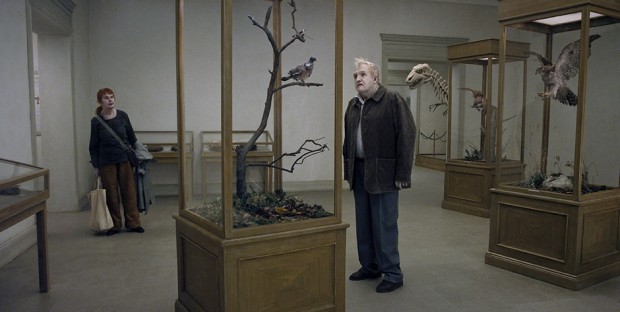
Roy Andersson‘s films are a rare Swedish treat, only coming after we patiently wait for him to carefully assemble those meticulous Studio 24 sets necessary to his peculiar works. His latest, A Pigeon Sat on a Branch Reflecting on Existence, doesn’t stray from the template of 2000’s Songs from the Second Floor or 2007’s You, The Living — the first two parts of a ‘living trilogy’ now concluded — but stagnation is hardly an issue with Andersson. All three films are collections of modern-life tableaux, ranging from the trivial to the absurd and often merging the two. They invariably display tremendous wit and unsettling undertones during elaborate fixed shots where people barely move – yet the sketch is often over before you’re done processing the rich details and the amount of information it contained. – Tommaso T. (full review)
Far From Men (David Oelhoffen; TBD)
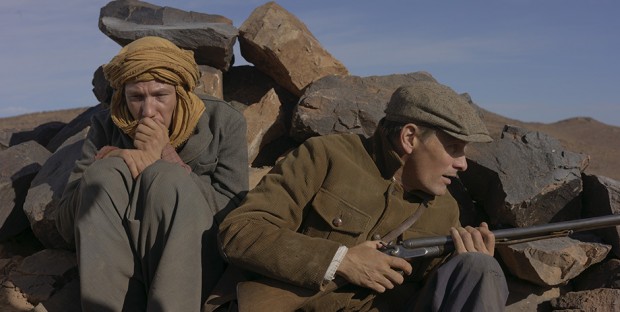
Writer/director David Oelhoffen has a special film on his hands because it’s powerful tale begs audience members to learn more about the subject. I’m not talking about the fictional character of Daru (Viggo Mortensen) secluding himself in the mountains to teach young Arab children how to read while civil war wages on or his unwitting ward of the state Mohamed (Reda Kateb) awaiting trial in Tinguit for murdering his cousin. I’m referencing the backdrop—where those mountains are and the “why” of the ongoing rebellion amidst them that spans two ethnicities, two languages, multiple races, and one common goal of freedom. – Jared M. (full review)
Goodnight Mommy (Veronika Franz and Severin Fiala; TBD)
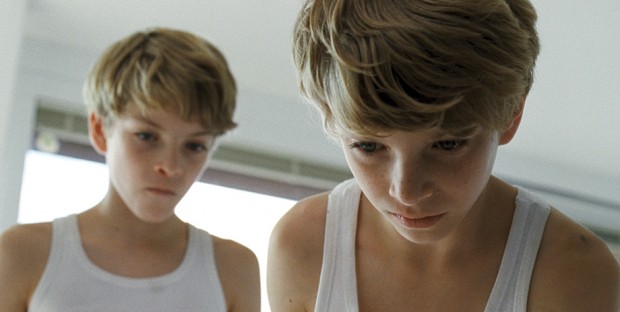
As its moniker suggests, one never quite knows that to expect when it comes to secret screenings during Fantastic Fest. At times they can be highly-anticipated titles that blow the doors off the venue or they can present films that had little-to-no demand that simply rock. This year was most certainly the latter as Goodnight Mommy (or Ich Seh Ich Seh) screened, a film I’m thoroughly convinced of its divisiveness and also one that I imagine will be highly rewatchable. There’s little doubt about the insanity within this chilling Austrian thriller. While the more vague the better, it is a cruel twisting narrative that too obviously telegraphs some aspects but also keeps a handful of the proceedings mysterious and is all the better for it. – Bill G. (full review)
Haemoo (Shim Sung-Bo; TBD)
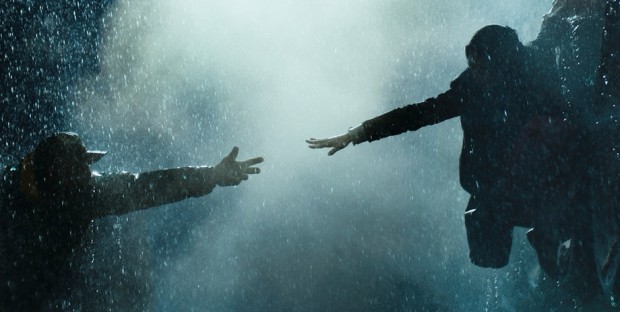
Haemoo is an effective moral thriller that immediately mirrors the best work of its co-writer and producer Bong Joon-ho. What starts as slow and straight-forward goes south quickly, raising the stakes drastically as difficult decisions are made — first for profit, and secondly for survival. Opening with a near-fatal, yet tone-setting accident on a fishing boat, Kang (Kim Yoon-seok) is a captain in a very difficult position. After a series of bad luck and poor financial decisions he finds himself over extended, unable to secure a bank loan to sail the ship as a legitimate cargo operation. Turning to the mob, Kang quickly finds himself in a moral dilemma: rather than leave his crew high and dry he reluctantly agrees to smuggle a group of Koreans leaving China with the promise of asylum in South Korea. – John F. (full review)
Hill of Freedom (Hong Sang-soo; TBD)

At only 66 minutes, Hong Sang-soo’s latest seems bound to be lost in the shuffle of not just fall festival fare making its way to select theatres and VOD (assuming it gets distribution this year) but even the auteur’s own prolific output. Ater all, even with as great a reputation amongst critics and cinephiles as Hong has, he still constantly faces accusations of making the same film over and over again. Yet if to get personal, on the lonely bus ride back from Toronto where I saw it, the film came to really emotionally coalesce for me in a way I didn’t expect from a “slight” work. – Ethan V.
Phoenix (Christian Petzold; TBD)
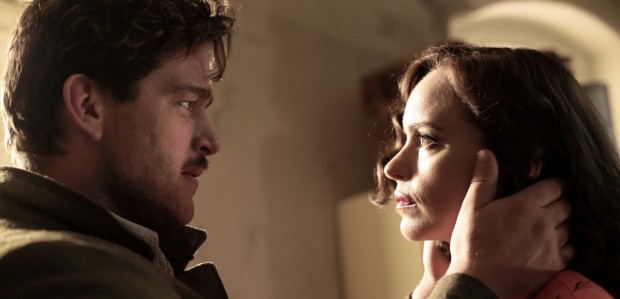
Following the Second World War, European auteurs probed its lingering national psychological fallout resulting in films such as Night and Fog, Hiroshima Mon Amour, and Germany Year Zero. Phoenix sits well within that style, its historical perspective strangely 60 years out of date but not unwelcome for it. Themes of identity, guilt, and misrecognition play out when a Holocaust survivor returns to Berlin. Nelly (Nina Hoss), who’s had reconstructive surgery on her face, seeks out her husband Johnny (Ronald Zehrfeld) in the ruins of the city even as her friend Lene (Nina Kunzendorf) warns her that Johnny betrayed her to the Nazis. – Martin J. (full review)
Samba (Olivier Nakache and Eric Toledano; TBD)
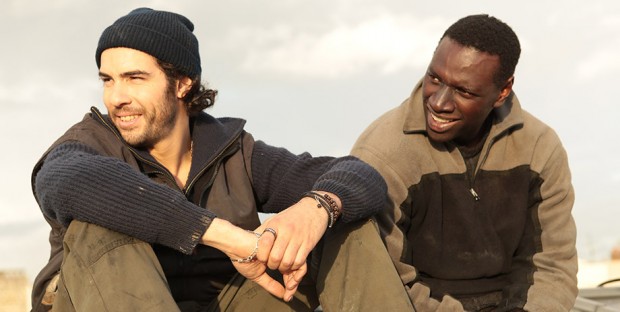
Every movie should have a score by Ludovico Einaudi and it’s comforting to see Olivier Nakache and Eric Toledano agree. After using his haunting music on the skillful Intouchables, the duo take a few tracks from his album In a Time Lapse to enhance their latest work Samba. Another drama dealing with serious issues that are oftentimes handled melodramatically, they find a way to infuse each character’s hardship with a delightfully comic streak. The formula is similar to that box-office record-break, with its two broken souls coming together to make the other a better person, but you won’t hear me complain considering there’s just as much heart. And with a little romance thrown in alongside a couple larger supporting roles, one could say the filmmakers have increased their cinematic scope while retaining equal emotional weight. – Jared. M (full review)
Spring (Justin Benson and Aaron Moorhead; TBD)

The first words in Colin Geddes’ TIFF description for Vanguard selection Spring are, “Before Sunrise gets a supernatural twist.” Naturally, I pushed everything aside to check out what it could mean. A horror romance from Aaron Moorhead and Justin Benson, its Italy-set journey of an American lost and alone proves equally suspenseful, grotesque, funny, and beautiful. The best part, however, is it’s smart and sensitive way of allowing the dark fantasy to enhance its love story rather than overshadow. Because at the end of the day, what’s onscreen isn’t necessarily out to scare us—although it will. Instead it shows love’s power to literally reinvent ourselves into that which we didn’t even realize we wanted to be. – Jared M. (full review)
Still the Water (Naomi Kawase; TBD)

Naomi Kawase’s Still the Water begins in a beguiling, abstract way that sets the tone for the rest of her film in more ways than one. First, a beautifully lit and framed shot of waves crashing over one another; next, a graphic slaying of a goat; then, a celebratory dance; finally, people gather near the shore and inquire about a drowned body. Was it a surfing accident, or something else? – Forrest C. (full review)
Time Out of Mind (Oren Moverman; TBD)
Finding a link between the shared title of Oren Moverman‘s third feature film, Time Out of Mind, and Bob Dylan’s 1997 album took a little effort. Moverman co-wrote the script for Todd Haynes’ fantastic Dylan saga I’m Not There, and perhaps it was here that the title resonated and, to the writer-director’s mind, could be grafted onto his latest, Richard Gere-led drama. – Zade C. (full review)
Tokyo Tribe (Sion Sono; TBD)

Though a hip-hopera (the last film to earn that label possibly being R. Kelly’s everlasting epic, Trapped in the Closet), Sion Sono’s Tokyo Tribe puts itself in the company of the extreme Japanese genre cinema eaten up by festival audiences, given their brutal violence and flagrant weirdness. Those essential thrills notwithstanding, it becomes off-putting in how one must struggle to keep up with the film throughout — not just in the narrative terms of story and character, but also its extreme formalism. The camera is constantly roving to seemingly new characters, gangs, and raps almost every couple of minutes — even if, on the other hand, the beats seem very redundant. Yet what makes Tokyo Tribe ultimately unique, if still problematic in its sheer amount of chaos, are the underlying politics. – Ethan V. (full review)
The Tribe (Myroslav Slaboshpytskiy; TBD)
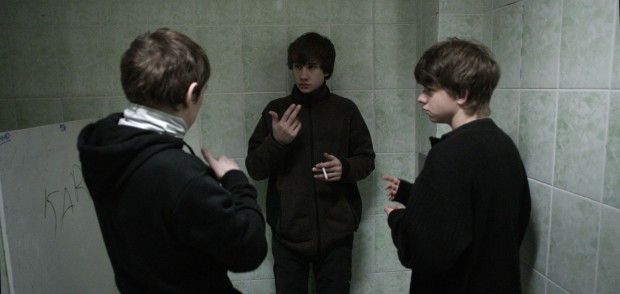
Devoid of any spoken words, music, voice-over or even subtitles, Myroslav Slaboshpytskiy‘s debut feature film The Tribe is communicated through sign language, for all the characters are deaf. This provides a unique challenge for any audience member not versed with how to sign, as the filmmaker provides no direct explanation of what characters are actually saying. While this may initially seem daunting, a viewer’s patience and keen observation is rewarded by a haunting cinematic experience that truly is unlike anything else this year. – Raffi A. (full review)
Welcome to New York / Pasolini (Abel Ferrara; TBD)
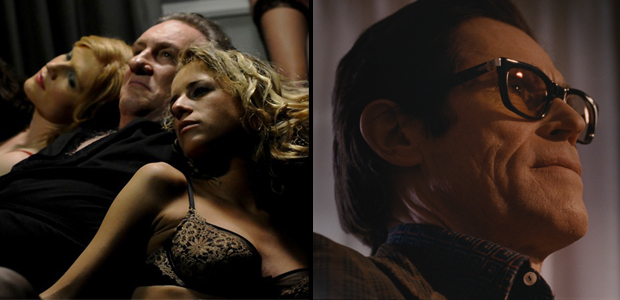
Two men of power and thus two representations of one of Ferrara’s key themes: the politics of everyday living, itself heavily indebted from Godard. Stylistically, they couldn’t seem more different. Pasolini is far more Ferrara-like with its plentiful number of superimpositions between fact and fiction, and Welcome to New York brings the anomaly of matter-of-fact, long-take master-shots of acts both mundane and awful. Yet ultimately each comes back to personal hells, self-projection, and an upending of each lead’s assumed class relations. – Ethan V.
Which of the above films are you most looking forward to?


